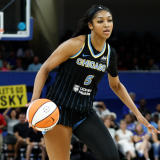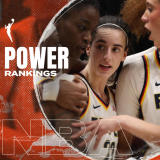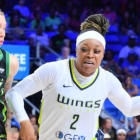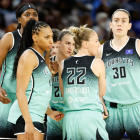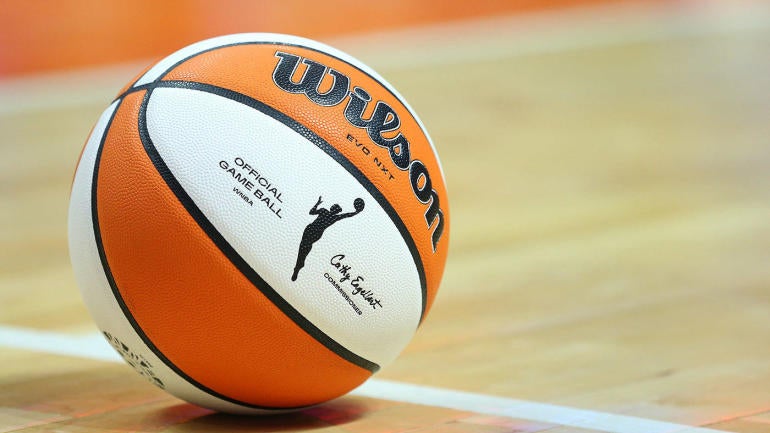
Shortly before the 2022 WNBA season, the Las Vegas Aces waived Mya Hollingshed, the No. 8 overall pick from this year's draft, while the Minnesota Lynx cut ties with Crystal Dangerfield, the 2020 Rookie of the Year. Both players were victims of the league's brutal roster crunch, which has gotten even worse in recent years due to CBA changes and an improved talent pool.
This spring, the issue has seemingly come to a head, with everyone from fans to star players calling for changes.
"In no circumstance should we have a league where top draft picks aren't on a roster," Los Angeles Sparks forward Chiney Ogwumike said.
Even in a perfect world, there are only 144 roster spots available in the league -- 12 on each of the 12 teams. But due to salary cap concerns, many teams only carry 11 players, making it even more difficult to earn a place.
"I think it really resonated this year because this is Year 3 with the new CBA," Stewart said. "Now as those contracts are being negotiated, being renegotiated, everybody's getting a little more expensive, I guess I would say. That creates fewer roster spots and fewer spots in the league in general."
No matter the situation, the most obvious option when you're running out of space is to expand.
One possibility is adding a few roster spots to each team. Doing so would open up more opportunities for players, while also creating more pathways for development. An under-discussed aspect of the league's roster problems is that in a small league with a short season, most coaches and GMs prefer veterans who can come in and play right away. Young players who may have potential but need time to grow are thus often overlooked and forced to improve their games overseas or on their own.
WNBA commissioner Cathy Engelbert, however, is in favor of adding new franchises to the league. Specifically, two new expansion teams in the next few years, though no exact timeline has been detailed.
"We're transforming the economics of the league," Engelbert said. "We want to bring new owners into the league longer term. We need to find the right time to do that. We're doing a lot of data analysis. … We'll continue to do that analysis and hopefully this summer at some point we'll be able to say more. But we want to be thoughtful about it."
"We don't want to jeopardize the momentum we have, but we understand the issue about roster sizes," Engelbert continued. "But when you're a country the size and scale of ours and you're only in 12 cities, growing the league is a way to do that as well. Then you open up roster spots. I don't think it's about rosters per team. It's about more opportunities to play for more players to play."
At this point, it seems clear that expansion is in the league's near future. But the how, when and where still need to be figured out. With that in mind, let's take a look at some cities and/or regions that would make sense for a new WNBA team.
The Bay Area
This is perhaps the most obvious option for a number of reasons, but primarily because there's an ownership group making an active push to bring a team to the region. The group, led by former WNBA All-Star Alana Beard, has received support from local politicians. In October of last year, the Oakland city council gave unanimous approval to a term sheet that would secure Oakland Arena (formerly Oracle where the Golden State Warriors played) as a future home.
Furthermore, the WNBA players association sent a tweet in January that seemed to hint at a team coming to the Bay Area. While responding to Delta Airlines, the WNBPA wrote, "just confirming you fly to Nashville, Toronto, and the Bay Area too, right? #BetOnWomen #ExpandTheLeague." That's no guarantee, of course, but it's worth noting.
Finally, there is a high level of support for all levels of basketball in that part of California, from the Warriors, to Stanford University's women's basketball team, which won the 2021 NCAA national championship, to the high school level. A WNBA team would fit in well.
Toronto
Like the Bay Area, Toronto was included in the WNBPA's tweet, which did not feel random. And like the Bay Area, Toronto is a basketball-crazy city. Just look no further than the thousands of fans that pack "Jurassic Park" for watch parties during the Raptors' playoff games in recent years. There would seemingly be an eager fanbase to support the team -- rapper Drake is on board -- and it would make sense for the WNBA to find a foothold in one of the biggest cities in North America.
There have been some half-hearted attempts at forming an ownership group in recent years, but none have gotten very far. Raptors president Masai Ujiri did reference the possibility of a WNBA team during an interview earlier this month, but declined to expand on the topic.
"The game is going global and I am really interested in the BAL [Basketball African League] in Africa. The WNBA. There are many things that intrigue us here," Ujiri said. "I know that I think we will continue to talk about how do we get this franchise even bigger in how we think. Whether it's facilities or even just thinking of the game more global, which is where my mind is always at."
While there are real positives to adding a team in Toronto, it's worth mentioning a specific challenge that could arise: travel. All WNBA teams currently fly coach in order to maintain competitive balance, and this often leads to flight delays and complicated scheduling. Adding an international team to the mix without addressing the travel issue could prove tricky.
Nashville
Nashville may not have quite as strong of a case as the two aforementioned cities, but it was included in the WNBPA tweet and the city has been actively preparing for the possibility. In October of last year, Nashville's Sports Authority Board commissioned a market study to assess the potential viability of a WNBA franchise.
"It's time to do something to support the women and girls in Davidson County," Councilwoman Nancy VanReece said. "We're doing the appropriate market study so any potential owner's group will have the data they need to make decisions. This is my personal opinion, but I would love to see it at the Municipal Auditorium."
Nashville does not currently have a professional basketball team, but does have the Tennessee Titans (NFL), Nashville Predators (NHL) and Nashville SC (MLS). There are, however, multiple Division I collegiate programs in the area, including Vanderbilt and Belmont, whose women's program made the second round of the NCAA Tournament this year in surprise fashion.
While the city would seemingly support a team, finding an ownership group and an arena may be a challenge. On that front, it's worth noting a January report from the Tennesseean suggested the city may be looking at adding a professional women's soccer team in the NWSL instead of a WNBA team.

CBS Sports HQ Newsletter
Your Ultimate Guide to Every Day in Sports
We bring sports news that matters to your inbox, to help you stay informed and get a winning edge.
Thanks for signing up!
Keep an eye on your inbox.
Sorry!
There was an error processing your subscription.
Philadelphia
Adding an expansion team is not a simple process no matter the sport or league, and work often begins years in advance. Thus, it's worthwhile to try and find the breadcrumbs that suggest what cities may be a possibility rather than throwing them out at random.
Case in point, Philadelphia. Last March, during an interview with a Philly radio station, Washington Mystics guard Natasha Cloud had the following to say:
"It's not necessarily a secret - that's what I was told - we are trying to get a Philly team. It has been in the works for a year and a half. Put a little pressure, not only on the city, but on the [WNBA], too. Our thing - for us to progress, our league needs to expand. We have to have more than 144 jobs. [...] Listen, it's in the works. I'm trying my damndest to bring a team back to Philly."
Again, the league would have to find an ownership group and an arena, which are never guarantees. Still, it's clear that Philadelphia is in the mix, and for good reason. Few cities have a deeper connection to basketball and their professional sports teams than Philadelphia. There's no question a WNBA franchise would have the fans' attention -- it may not always be positive, but they would be there and they would care.






